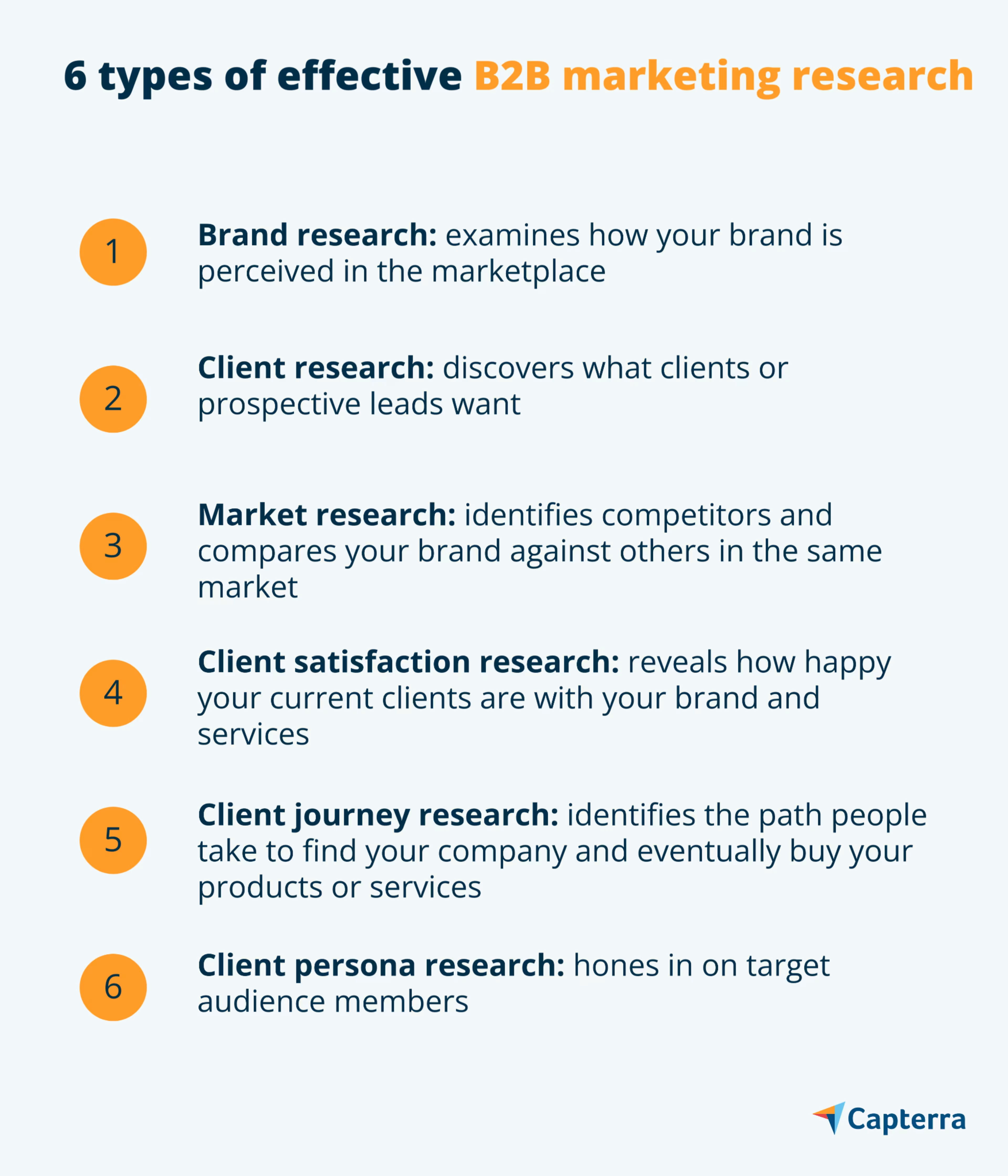Effective market research can give your business a number of advantages in a crowded field—here’s how to get started
The B2B industry is competitive and always evolving, and it can be difficult to carve out a successful niche for your company. Your company will find B2B sales easier if your B2B marketing is more effective and successful.
Like any other marketing, B2B marketing is only effective if you conduct appropriate research. Researching your target audience and your brand’s position in its industry, among other factors, provides you with crucial knowledge you can use to make sure future marketing campaigns go well.
Not sure where to start? Here’s everything you need to know about conducting effective B2B marketing research.
B2B marketing research—why you need it
B2B marketing research means discovering insights on your marketplace and current industry position by surveying representative samples of participants. In simpler terms, it means:
Developing valuable questions for the most relevant audience
Analyzing the data to reveal trends
Leveraging the analysis to guide your company's response to a specific challenge
In B2B marketing research, you might involve participants such as existing customers, prospective buyers, influencers, and others. Generally, the more B2B marketing research you do, the more insights your brand can leverage to engage customers more effectively.
benefits of b2b marketing research
So why is B2B marketing research truly necessary? Because it leads you to better growth and profitability by helping you:
Better understand your target customers/leads and their behavior
Know how to craft more effective marketing campaigns
Counteract efforts by competitors in the marketplace
Reveal useful customer or market trends
Discover new opportunities before your competitors
Information is power in any business, especially B2B businesses. If you perform B2B marketing research effectively, your marketing will be more successful, and your sales pipeline will improve in the long run.
How to perform effective B2B marketing research
You can’t simply whip together a few surveys and call your B2B marketing research complete. Instead, you should leverage specific strategies known to improve B2B marketing research results and reliability.
1. Determine the research type
First, you need to know the type of research you will be performing. There are many different types of B2B marketing research to rely on, including:

The most successful B2B marketing campaigns are focused and targeted, but you should only try to research one or two of the above elements at once to keep your research clear and focused. Once you know the research type you need to perform, you can move on to the next step.
2. Collect data
In B2B marketing research, you’ll gather data using two collection methods: qualitative and quantitative.
Qualitative data collection means you or your researchers engage more closely with clients and other participants to gather experiences and opinions. This research is more time-consuming and can be more difficult to analyze. However, it may also provide you with more in-depth data and let you ask more open-ended questions. An example of collecting qualitative data is analyzing answers from a focus group.
Quantitative data collection means you analyze smaller sample data sets with much more volume. For example, you may create a questionnaire and ask multiple people the same questions, then look at their multi-choice answers to get a quicker consensus without deeply analyzing the data.
Both types of data collection can be valuable.
For example, brand research may benefit from qualitative data collection. You can ask for opinions from current or prospective leads and customers. In contrast, client satisfaction research may be best served by quantitative data collection. You can offer current clients a survey rating your services from one to five, then analyze their answers.
3. Ask for the right questions
After deciding on your data collection method, you’ll need to ask the right questions during your B2B marketing research. You have a few different options depending on the type of research you wish to perform, such as:
Yes/no questions, which only provide you with binary answers.
Multiple-choice questions, which are the ideal type of questions for quantitative research.
Scaled questions that allow you to gauge client responses on a continuum, such as from 1 to 10.
Matrix questions, which are close-ended and used to evaluate different items using a set of criteria.
Open-ended questions, which are used in qualitative research and data collection.
Again, match up the types of questions you need to ask with the type of research you want to perform. Then you’ll be more likely to get the responses you need to ensure useful data analysis.
4. Gather the right participants
The right survey or data collection respondents can make or break your B2B marketing research. Overall, you need more participants if you ask open-ended questions and want to perform in-depth research. Smaller groups of participants are ideal for quantitative research questions or getting opinions on very small, specific aspects of your business.
Regardless, make sure to gather participants for your B2B marketing research from a random sample of clients, leads, or the public. Randomness ensures that you don’t contaminate the participant pool or accidentally gather data from people who are too in favor of or against your brand.
5. Research regularly enough
The last key to conducting effective B2B marketing research is conducting research regularly. Most businesses should do market research at least quarterly. It allows you to keep tabs on the pulse of the market and see how your brand’s reputation and growth are progressing in the eyes of your clients.
Quarterly research is not so often that you will run out of time or have to divert resources away from other projects or areas of your company.
Ready to get started researching?
Good B2B marketing research can supercharge your current marketing efforts and ensure your future marketing campaigns are well informed. Good marketing leads to great results in terms of lead conversion and profits, helping your company secure a place in its industry for years to come.
Why wait? Capterra Shortlist for market research software is the best place to get started looking at the top-rated tools, rated by software users who have used and evaluated the solutions themselves.
Are you interested in becoming a guest writer for Capterra? Reach out to guestcontributors@gartner.com for details.
